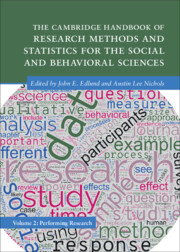 The Cambridge Handbook of Research Methods and Statistics for the Social and Behavioral Sciences
The Cambridge Handbook of Research Methods and Statistics for the Social and Behavioral Sciences from Part II - Important Methodological Considerations
Published online by Cambridge University Press: 12 December 2024
This chapter is concerned with reliability as a key indicator of measurement quality in behavioral and social science research. It commences with a discussion of the basics and a definition of the reliability coefficient. The following section deals with the meaning, interpretation, and utility of the reliability concept. Subsequently, the focus is on the evaluation of reliability as well as its discrepancy from the popular coefficient alpha that has been widely used for a number of decades as an index related to reliability. The large-sample behavior of the alpha and scale reliability estimates is then discussed, as is the relationship between the reliability coefficient and that of standardized reliability. The conclusion points out the limitations of the procedures for reliability evaluation discussed in the chapter.
To save this book to your Kindle, first ensure no-reply@cambridge.org is added to your Approved Personal Document E-mail List under your Personal Document Settings on the Manage Your Content and Devices page of your Amazon account. Then enter the ‘name’ part of your Kindle email address below. Find out more about saving to your Kindle.
Note you can select to save to either the @free.kindle.com or @kindle.com variations. ‘@free.kindle.com’ emails are free but can only be saved to your device when it is connected to wi-fi. ‘@kindle.com’ emails can be delivered even when you are not connected to wi-fi, but note that service fees apply.
Find out more about the Kindle Personal Document Service.
To save content items to your account, please confirm that you agree to abide by our usage policies. If this is the first time you use this feature, you will be asked to authorise Cambridge Core to connect with your account. Find out more about saving content to Dropbox.
To save content items to your account, please confirm that you agree to abide by our usage policies. If this is the first time you use this feature, you will be asked to authorise Cambridge Core to connect with your account. Find out more about saving content to Google Drive.